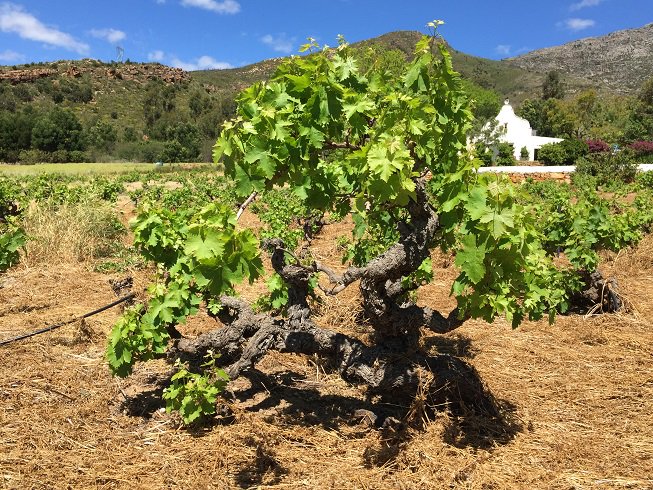Su Birch: The Old Vine Project goes to the next level
By , 3 November 2016
In Stellenbosch you’ll find two men with a mission – a mission to safeguard South Africa’s ’s heritage of old vines. Armed only with secateurs and laptops, they face a huge challenge. André Morgenthal who spent 15 years at Wines of South Africa and has started his own business, and Jaco Engelbrecht, a tech-savvy viticulturist, are the team tasked with managing The Old Vine Project and getting the South African wine industry behind it.
With seed funding from businessman and winery owner Johann Rupert and the legendary viticulturist Rosa Kruger as one of the directors, The Old Vine Project (a newly launched Not for Profit, Public Benefit Organization) is beginning to take shape. The objective is to preserve the South African vineyards that are 35 years of age and older through sustainable trade. There are currently 2621,5 hectares of vineyards that are this age, but only an estimated 7% have been identified and resuscitated and result in an identifiable wine brand. The rest are all under threat of being pulled up. “There’s a long way to go”, admits Morgenthal.
The wines made from old vineyards have been huge drivers in changing the perceptions of South African wine, and so they play a disproportionately important role. Wines such as Eben Sadie’s Old Vineyard series and Chris Alheit’s Cartology, Magnetic North Mountain Makstok and Radio Lazarus have provided the spark for many more brands that have got the critics and the drinkers raving – think of the old vine series from Ian Naudé, David and Nadia Sadie, Adi Badenhorst, DGB, and Mullineux And there are more superb quality wines every year. Morgenthal explains that all these wines, even though they are so different, have the weight, the mouth feel and the denser texture that is characteristic of wines from all old vineyards elsewhere in the world.
South Africa has 39 varieties in its list of old vineyards and that is pretty unusual. The biggest variety is Chenin blanc at 52%, with Cinsault and Pinotage at 5%, Palamino at 4% and Sauvignon blanc, Semillon, Syrah and Tinta barocca next in the rankings. These are mostly bush vines and most are not irrigated. Engelbrecht, who has specialized in the rehabilitation of old vineyards, is planning research to identify what it is that has made these specific vines survive. What is known is that these vines which have stood all these years in the same soil throughout all the differing seasons are no longer the wines they once were – their DNA has changed slightly.
In a country where many vineyards are plagued by leaf roll virus, yields start to plummet at between 15 and 20 years old, and growers schedule them for replacement. Morgenthal explains that the OVP not only needs to rescue the existing old vines, but also persuade farmers to protect this cohort so that they will become the old vineyards of the future. How to do this? As with everything, it is about money. Growers need to be rewarded properly; keeping low yielding vineyards has to be financially viable. For old vineyards with yields of a mere two or less tons, this means that buyers must pay a minimum of R10 000 per ton. Players like Sadie and Alheit already pay well above this.
What is involved in rescuing an old vine? “Well”, says Morgenthal, “Rosa Kruger says the answer lies in thinking of them as very old people. They need to be treated with great respect, pruned gently and fed carefully. Sometimes a little interplanting of young vines will relieve their boredom and keep them active.” For Kruger, the old vines project has been a labour of love for over 10 years, so she has seen the exceptional results of a little TLC given to these golden oldies.
The oldest vine in South Africa is in Heritage Square in the centre of Cape Town – a Crouchen blanc that dates back to around 1771. Very few vines will survive nearly 250 years but, with the Old Vines Project in the hands of Morgenthal and Engelbrecht, South African vineyards may have a fighting chance of reaching their half century.
For more information email Morgenthal at andre@andremorgenthal.com. The current website Iamold.co.za is being revamped and will be relaunched later this year.
- Su Birch is the former CEO of Wines of South Africa and is now involved in running wine touring website TasteTrip.co.za. This article originally appeared on UK wine trade website The Buyer.








Comments
0 comment(s)
Please read our Comments Policy here.